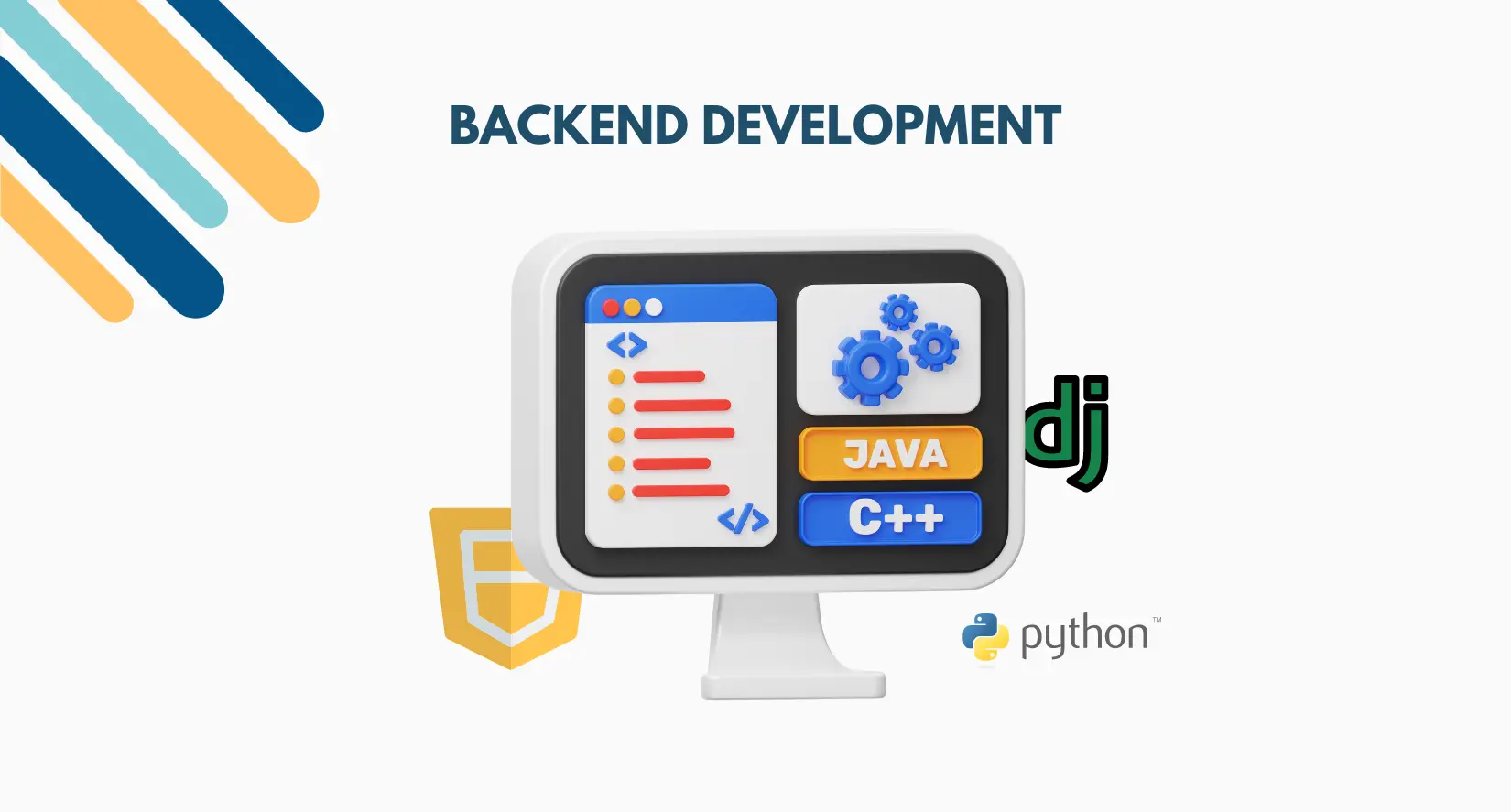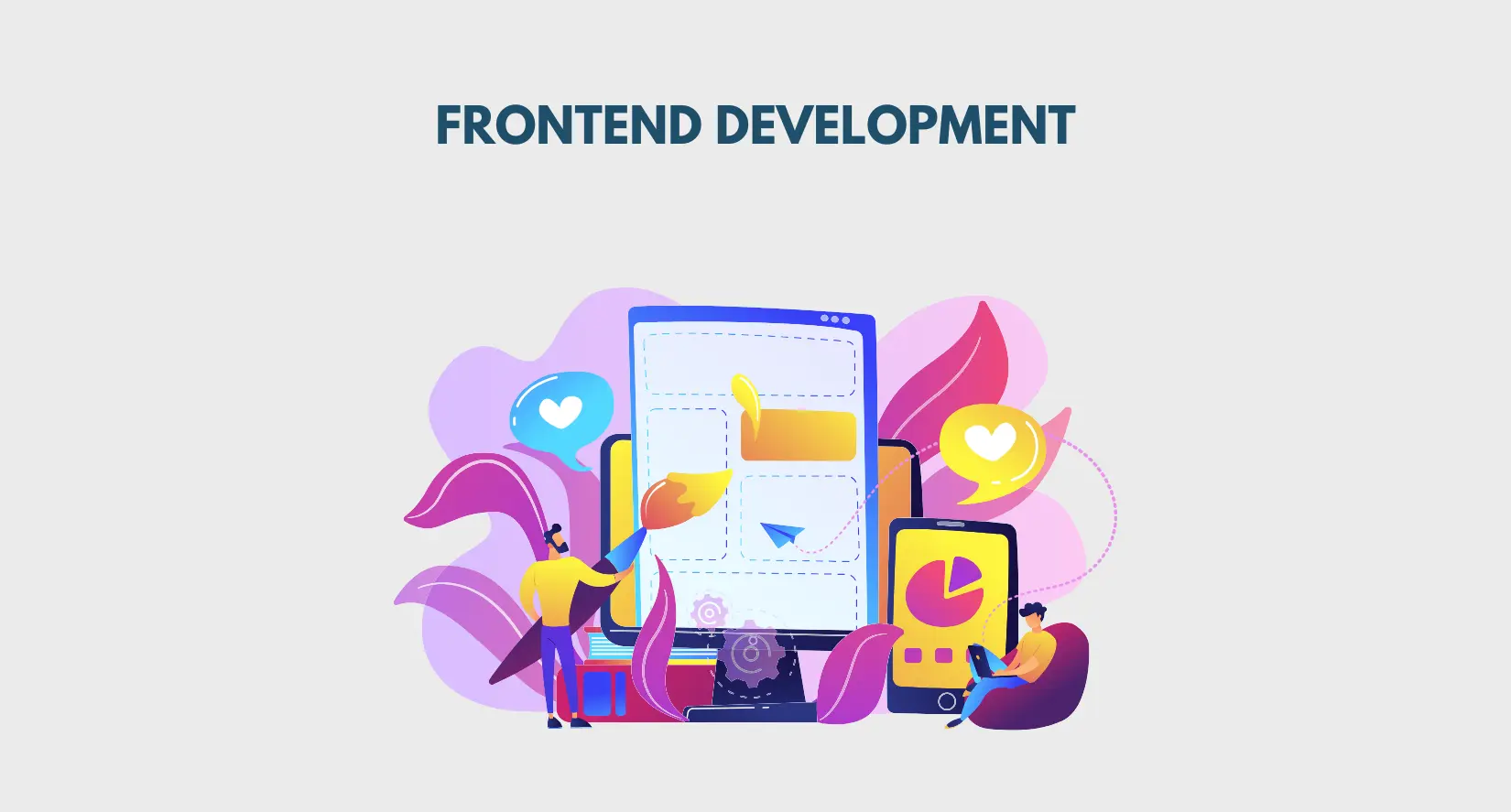
What is Back-end Development?
You can think of backend development as the kitchen of a restaurant where all the cooking processes take place. The customers are unaware of the processes done in the kitchen, which we call the backend process. Similarly, backend development in software handles all the logical requirements for a software project. It ensures that every request from the user is properly processed. The backend is hosted on a remote server which remains always ready to handle all the requests from the frontend of our software.
Popular Languages & Frameworks for Backend Development.
- Languages: Python, Javascript, Java, C++, etc.
- Frameworks: NodeJs, SpringBoot, Django, Flask, Ruby on Rails etc.

What is Frontend Development?
You can think of front-end development as the server in a restaurant. It takes all the orders from the customers and passes them onto the kitchen for processing. The customers only need to know the server who is responsible for fulfilling the request of the customer. Similarly, Frontend development in software takes all the inputs from the users from various methods(form, button click, etc) and passes it to the Backend for processing. Once the request is successfully processed, the backend provides a meaningful response to the front end and thus to the end user.
Popular Languages & Frameworks for Frontend Development.
- Languages: HTML, CSS, Javascript, Python, etc.
- Frameworks: ReactJs, Django, NextJs, Angular, Vue etc
Career Opportunities - Frontend Vs Backend
A Report from Upwork
According to a recent Upwork report, frontend developers are in more demand than backend developers on freelancing platforms. It doesn’t mean the backend developers have fewer opportunities compared to the front-end developers. There are lots of opportunities in the Backend Development career.
Average Salary in the United States
Backend Developer:
- Average Salary: $110,000 - $130,000 per year
- Junior Level: $80,000 - $100,000
- Mid-Level: $110,000 - $130,000
- Senior Level: $140,000 - $170,000+
- **Top Skills Impacting Salary:**Node.js, Java, Python, Ruby on Rails
- Databases (SQL, NoSQL)
- Cloud services (AWS, Google Cloud)
Frontend Developer:
- Average Salary: $90,000 - $120,000 per year
- Junior Level: $70,000 - $90,000
- Mid-Level: $100,000 - $120,000
- Senior Level: $130,000 - $150,000+
- Top Skills Impacting Salary: JavaScript, React, Angular, Vue.js
- HTML/CSS, SASS/LESS
- Responsive design, UX/UI knowledge
Factors Affecting Salaries:
- Location: Location directly impacts the average salary for both roles.
- Experience: More experienced developers can command higher salaries.
- Company Type: Startups may offer lower base salaries but compensate with equity, while large companies may offer higher salaries.
In general, backend developers often earn slightly more than frontend developers, mainly due to the complexity of backend systems and infrastructure.
What to Learn First?
- Know Your Strengths (Visual Design vs. Logical Thinking)
Before you jump into learning front-end or back-end development, it's important to think about your strengths and what you enjoy. If you’re someone who likes designing things, and working with colors, layouts, and user interfaces, front-end development might be a good fit. It’s all about making websites look great and easy to use. On the flip side, if you're more interested in solving complex problems, working with data, and creating systems that run in the background, back-end development could be your thing. Back-end work is more about building the “engine” that powers the website or app.
- Why Learning Front-End First Can Be a Good Start
A lot of beginners start with front-end development, and for good reason. Here’s why it might be a better starting point:
- See Your Progress Right Away: One of the great things about front-end development is that you can see the results of your work instantly in the browser. If you write some HTML or CSS, you can immediately see how it changes your webpage. This is motivating when you're starting.
- Learn the Basics of How Websites Work: By learning front-end first, you get to know the building blocks of websites like HTML, CSS, and JavaScript. Even if you later move to back-end development, these are skills you’ll always need.
- Easy Wins: When you’re just starting, it’s nice to have some quick successes. With front-end, you can create simple web pages and see your progress without needing to know too much right away. These small victories can keep you going.
- More Job Opportunities: Many entry-level developer jobs are focused on front-end work. Every website or app needs a good user interface, so starting with the front end can give you a better chance of landing your first job.
Learning front-end first gives you a good foundation to build on, whether you decide to stick with it, move to back-end, or eventually become a full-stack developer.
Conclusion
Deciding whether to start with front-end or back-end development depends on your strengths and interests. If you love working on visuals and creating user-friendly interfaces, front-end might be your path. On the other hand, if you're more interested in solving problems behind the scenes and working with data, back-end development could be the way to go.
Regardless of which one you choose, starting somewhere is the key. You can always learn both and become a full-stack developer down the road. If you're ready to dive deeper, check out these comprehensive tutorials to get started:
For readers in Jammu, Gurcademy offers hands-on courses in both front-end and back-end development. Whether you're just starting or looking to expand your skills, we have a course for you! Learn more about our offerings here:
Start your journey in tech with the right guidance and resources!


